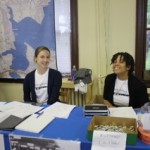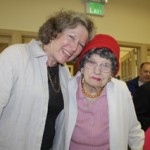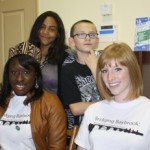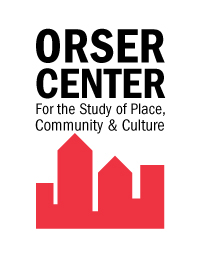 “American Studies 422: Preserving Places, Making Spaces in Baltimore” is an applied research course in the Department of American Studies at the University of Maryland, Baltimore County (UMBC). During the spring 2011 semester, students worked with Professor Nicole King to explore the important role of historic places in sustaining vibrant urban culture. After readings on public history projects such as The Power of Place: Urban Landscapes as Public History and The Baltimore Book: New Views of Local History, students partner with a local non-profit community organization to develop an innovative preservation and public history project on overlooked people and places in Baltimore. During the spring 2011 semester, students worked on the Greater Baybrook area in South Baltimore.
“American Studies 422: Preserving Places, Making Spaces in Baltimore” is an applied research course in the Department of American Studies at the University of Maryland, Baltimore County (UMBC). During the spring 2011 semester, students worked with Professor Nicole King to explore the important role of historic places in sustaining vibrant urban culture. After readings on public history projects such as The Power of Place: Urban Landscapes as Public History and The Baltimore Book: New Views of Local History, students partner with a local non-profit community organization to develop an innovative preservation and public history project on overlooked people and places in Baltimore. During the spring 2011 semester, students worked on the Greater Baybrook area in South Baltimore.
A Faculty Innovation Grant funded by the Kauffman Foundation through the Alex. Brown Center for Entrepreneurship at UMBC provided the seed money for this course. The course teaches students about social entrepreneurship, which balances creating social good with making a profit to sustain the future. The $1,500 Faculty Innovation Grant provides the funds for the event and any profits over the original $1,500 are donated to a non-profit organization based in Baltimore. All of the profits from the spring 2011 course were donated to the Baybrook Coalition, a 501c(3) non-profit organization with the goal of improving the Greater Brooklyn area.
Greater Baybrook is comprised of the industrial communities of Brooklyn, Curtis Bay, Fairfield, Hawkin’s Point, Masonville, and Wagner’s Point. On May 14, 2011 the students hosted an event—Bridging Baybrook: Preserving the Past, Developing the Future—that drew over one hundred people to the Polish Home Hall, a historic community building owned by the Baybrook Coalition. The event was a community celebration incorporating public history programming, art, music, food, and events for children. Tickets were sold for $5 to community residents and $15 for visitors. The ticket included a program of historical essays on the various neighborhoods in Greater Baybrook prepared by Professor King and the students and access to all the food, entertainment, and events throughout the day (2-6pm).
The first floor was decorated in spring colors and had a history table, with materials including history panels the students designed, and a large map where community members could discuss the important places in the community. The history table also sold t-shirts and buttons the students designed. A delicious Barbeque lunch with all the fixings was provided with hot dogs and macaroni and cheese for children. There was also a kids’ station outside where young visitors could build greenhouses, paint rocks, or play horseshoes. Children twelve and under (accompanied by an adult) were provided free access to the event. Students in the course worked with local students (from both Curtis Bay Elementary and Chesapeake Center for Youth Development) over the previous month in making art that represented place in their community.
 The art was featured on the second floor as part of a silent auction where the artists received half of the profits and half went to the community. The second floor also had a stage where various musical acts performed. By holding this event, the students commemorated a sense of place in the community and offered a space to gather, reflect, and make new memories. During the event Carol Eshelman, executive director of the Baybrook Coalition for the past decade, was honored upon her retirement. On the day of the event, the students raised $1,200. After replenishing the $1,500 seed money for the course, the students donated $400 to the Baybrook Coalition and provided $70 to local students for their part of the proceeds from their art.
The art was featured on the second floor as part of a silent auction where the artists received half of the profits and half went to the community. The second floor also had a stage where various musical acts performed. By holding this event, the students commemorated a sense of place in the community and offered a space to gather, reflect, and make new memories. During the event Carol Eshelman, executive director of the Baybrook Coalition for the past decade, was honored upon her retirement. On the day of the event, the students raised $1,200. After replenishing the $1,500 seed money for the course, the students donated $400 to the Baybrook Coalition and provided $70 to local students for their part of the proceeds from their art.
The course and the event were great successes. Professor Nicole King and Steve Bradley (Associate Professor in Visual Arts) were awarded an IRC/CAHSS Summer Faculty Residency for 2011 for an online public history mapping project in the Greater Baybrook community. They will work with Dan Bailey, Lee Boot, Eric Smallwood, and Abbey Salvo to launch a prototype of the Mapping Baybrook Project over the summer/fall.





